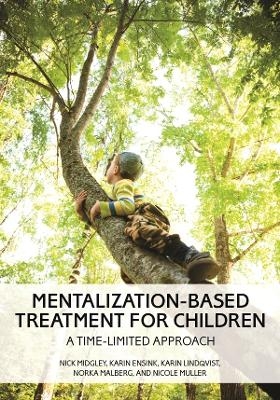
Mentalization-Based Treatment for Children
American Psychological Association (Verlag)
978-1-4338-4243-6 (ISBN)
This book is the first comprehensive clinical introduction to using Mentalization-based treatment (MBT) with children, 5-12 years old, who experience emotional and behavioral problems including anxiety, depression, and relational difficulties.
Mentalization--based treatment (MBT) promotes clients’ ability to interpret the meaning of others’ behavior by considering their underlying mental states and intentions, as well as clients’ capacity to understand the impact of their own behaviors on others. Written by an international team of clinician--researchers who are pioneering the MBT model with children, the authors begin by exploring the significance of mentalization and then devote the core chapters to the process of conducting short-term (9--12 sessions) MBT for children, including problem assessment and case formulation in terms of mentalizing techniques, the therapist’s stance, and treatment termination.
The approach draws on traditional psychodynamic principles, but integrates them with findings from attachment theory, the empirical study of mentalization, and features of other evidence--based approaches. This book includes a chapter-length case illustration and an appendix that lists measures of reflective functioning in children and their parents, as well as validation articles.
Nick Midgley, PhD, trained as a child and adolescent psychotherapist at the Anna Freud National Centre for Children and Families and is a senior lecturer in the Research Department of Clinical, Educational and Health Psychology at University College London. He is the codirector of the Child Attachment and Psychological Therapies Research Unit (ChAPTRe) at Anna Freud/University College London and has published widely, including coediting the book Minding the Child: Mentalization-Based Interventions for Children, Young People and Families (Routledge, 2012). Karin Ensink, PhD, is a professor of child and adolescent psychology at the Université Laval in Québec, Canada, where she teaches mentalization-based treatment (MBT) and psychodynamic psychotherapy with children, adolescents, and parents. She completed her PhD under the direction of Mary Target and Peter Fonagy. Her research and clinical work continue to focus on the development and assessment of mentalization in children, adolescents, and parents. She has a particular interest in understanding failures of mentalization in the context of parent–child interactions and how this relates to psychopathology and personality, as well as treatment. Karin Lindqvist, MSc, is a clinical psychologist trained in MBT for children (MBT–C) and parents at the Erica Foundation, Stockholm, Sweden, where she works part time as a researcher and clinical psychologist. Dr. Lindqvist's research concerns psychodynamic psychotherapy with children, adolescents, and adults. She is trained in reflective functioning and has done research on mentalizing capacity in clinical samples. In addition to working at the Erica Foundation, she works with children in foster placement and their families in Stockholm. Norka Malberg, PsyD, is a certified child and adolescent psychoanalyst who trained at the Anna Freud Centre in London and obtained her doctorate at University College London for her adaptation of MBT to group work in a pediatric hospital setting. She is currently an assistant clinical professor at the Yale Child Study Center in New Haven, Connecticut, where she is also in private practice. She has a special interest in the applications of MBT to children in foster care as well as those experiencing chronic illness and other impinging somatic conditions (e.g., epilepsy, chronic eczema, asthma). Nicole Muller, MS, MSc, is a child and adolescent psychotherapist and family therapist based at the De Jutters Child and Adolescent Mental Health Service, The Hague, Netherlands. Originally trained as a cognitive behavioral therapist, she became interested in MBT, which she has used for many years in her work with children and adolescents with attachment disorder, trauma, or emerging personality disorder and their families. One of her areas of expertise is working with fostered and adopted children and their families
Foreword
Peter Fonagy
Acknowledgments
Introduction
Part I. Theoretical Framework
Chapter 1. The Development of Mentalizing
Chapter 2. When the Capacity for Mentalizing Is Underdeveloped or Breaks Down
Part II. Description of the Therapeutic Approach
Chapter 3. The Structure and Aims of Time-Limited MBT–C
Chapter 4.The Therapist Stance in Time-Limited MBT–C
Chapter 5. The Process of Assessment in Time-Limited MBT–C
Chapter 6. Direct Work With Children in Time-Limited MBT–C
Chapter 7. Working With Parents From a Mentalization-Based Framework
Chapter 8. Moving Toward Goodbye: Endings in Time-Limited MBT–C
Chapter 9. Time-Limited MBT–C: A Case Study
Conclusion: Looking Back and Looking Forward
Appendix: Measures of Reflective Functioning in Children and Parents
References
Index
About the Authors
| Erscheinungsdatum | 03.01.2023 |
|---|---|
| Verlagsort | Washington DC |
| Sprache | englisch |
| Maße | 178 x 254 mm |
| Themenwelt | Geisteswissenschaften ► Psychologie ► Entwicklungspsychologie |
| Geisteswissenschaften ► Psychologie ► Klinische Psychologie | |
| Medizin / Pharmazie ► Medizinische Fachgebiete ► Psychiatrie / Psychotherapie | |
| Sozialwissenschaften ► Soziologie | |
| ISBN-10 | 1-4338-4243-2 / 1433842432 |
| ISBN-13 | 978-1-4338-4243-6 / 9781433842436 |
| Zustand | Neuware |
| Haben Sie eine Frage zum Produkt? |
aus dem Bereich


